- Home
- Lissa Evans
Spencer's List Page 9
Spencer's List Read online
Page 9
He zipped his green quilted coat up to the last possible tooth and started to pull on a pair of large, stiff, sheepskin gloves. ‘How is your father? I haven’t seen him for a month or so.’
‘Oh… up and down. Mainly down, actually. Last week would have been their ruby wedding anniversary so he’s been a bit depressed.’
He nodded sympathetically, and then rocked on his toes a couple of times, having run out of conversation. His gloved hands stuck out like garden forks. Iris half turned back to the keyboard. ‘Any problems?’ he asked, suddenly.
‘What?’
‘With the computerization?’
‘Oh, right. No. It’s fairly straightforward.’ The silence lengthened, broken only by the hoarse honk of a passing train, clattering towards Liverpool Street on the embankment track that overlooked the surgery. Patient opinion of Dov Steiner was divided sharply into those who (like her father) assumed that his absence of small talk was a professional choice which freed up his intellect for brilliant diagnosis, and those who (like Ayesha) referred to him as The Martian. Iris had become adept at judging into which camp a new patient would fall, and would divert people who required regular communication to Dr Petty, who liked talking so much that he rarely did anything else.
As she wondered whether she could resume work without appearing too rude, a low buzzing noise gradually became audible which, after a few baffled moments, she identified as Dr Steiner humming. There was no particular tune, but the sound rose and fell in pitch as if a distant stunt plane were looping the loop. He was staring past her shoulder, apparently at the computer, although his glasses had caught the light in such a way as to be completely opaque; he looked as though he had taken root.
‘Is there anything I can help you with, Dov?’ she asked, tentatively. The humming stopped.
‘No, no. Nothing. I was just thinking.’ He scratched his nose with a rigid finger.
‘Only I really do have to get on.’ She riffled some pages of notes to back up her statement.
‘Right.’ For a moment, nothing happened, then to her relief he swivelled on the spot and disappeared back into the waiting room. He walked like a pair of scissors, hinged from the waist and almost on tiptoe, and his diminishing staccato footsteps became lost under the noise of her fingers on the keyboard. Then the exterior door slammed, and she was left on her own.
The surgery stood on the edge of an artisans’ estate, built in 1889 for the ‘hygienic and practical habitation of foundry workers and their families’. The phrase was quoted on a ceramic plaque screwed to the side of the house that Iris grew up in, and it was the first prose that she had ever learned by heart. The foundry had long gone and the estate had reverted to the council, but the houses were still deemed hygienic and practical enough to have spiralled in value, and the fourteen streets contained an uneasy amalgam of tenants and owners. Her father had long been retired when the opportunity to buy presented itself, and it was his running, bitter refrain that he could have been sitting on a diamond mine by now.
As she set the alarm and locked the surgery, Iris’s heart sank at the thought of this evening’s visit. She never normally saw her father on a Monday, but yesterday she had tried to enforce the twenty-minute cut-off resolution during his phonecall, and the result had been awful. He had been in the middle of a rumination about which items of clothing he could spare for the church jumble sale, and had become very huffy and hurt when she tried to ease the conversation to a close. ‘I’m sorry if I’m keeping you from something,’ he’d said.
‘No, no it’s just that –’
‘No, if you’re busy you must get on. I know how full your life is.’
‘It’s just that –’
‘No, no – there’s no need to say anything. You just ring me when you can spare a little bit of time.’ He’d put the phone down, leaving her wincing. He was so quick to take umbrage, he always had been, but the trait had worsened since her mother’s death, as if he were one huge exposed nerve, picking up even the vibrations in the surrounding air. She’d tried to phone him again later, but the number was engaged, and immediately after that Robin’s girlfriend had rung and he had disappeared into his room with the receiver and remained there until well after half-past ten, her father’s unalterable bedtime.
She had worried all day at the surgery, finally deciding that an unscheduled visit might help to mollify him. It was only a five minute walk from Sarum Road to Alma Crescent, along streets much tidier than those in Dalston, and past front gardens that contained shrubs rather than dismembered gas stoves. Number 1 was a red-brick end-of-terrace with a crisp privet hedge and a gate with a rat-trap spring which the postman had complained about several times, but its unique glory was the double row of tiles with which a nameless craftsman had decorated the blank end wall. They were obviously hand made, and of two designs: a stiff little flower, and a bun-faced bull-necked lady with a crown. The house was named Victoria Cottage, in her honour. Iris had always loved the tiles; when the twins were little, in the difficult two years when they were all still living at home, their daily walk had always paused by the end wall, so that two mittened forefingers could point up at the queen. Robin’s first word had been ‘lady’, though he’d applied it with equal enthusiasm to men and lamp-posts.
She gave the tiles a quick glance as she rounded the corner, and then stopped dead. The upstairs curtains were closed and the house was in darkness. Instantly, her heart was pounding and she groped in her pocket for the keys and, failing to find them, fumblingly unzipped her bag and started pawing through the contents, wondering if she could possibly have left them at home. Closed curtains meant illness, they meant her mother laid out on the bed in her best nightie with her hair brushed flat against the pillow. The keys weren’t in her bag. She took a deep breath and then forced herself to search again, methodically this time, and found them almost at once, nestling between the pages of a book. The gate smacked shut behind her with its usual startling force, and as she inserted the key in the lock, some automatic spirit of courtesy led her to ring the bell just before she opened the door.
‘Dad?’
She stumbled over something, a rustling plastic shape, and reached out for the light switch, sweeping her hand across the wall until she found it. The hall was full. An old bedside table stood by the coat pegs, and beside it three bin liners, tops neatly tied. There was a pair of child’s wellingtons at the foot of the stairs, and her mother’s sheepskin car coat hung over the banisters.
‘Dad?’ She started up the stairs, and sensed, rather than distinctly heard, a noise from the bedroom. The door to the boxroom was open and the contents seemed to have flowed out across the landing. She picked her way through the junk: old rolls of wallpaper, a box full of half-used balls of wool, a stained projector screen, an ancient fan-heater. Just as she reached the bedroom door, she heard her father’s voice.
‘Don’t come in, Iris.’
‘Dad, are you all right?’
‘Yes, but don’t come in.’ He sounded almost panicky. She hesitated on the landing, her hand resting on the naked bulb of a defunct standard lamp.
‘Have you been ill? Do you need anything?’
‘No, no. I wasn’t expecting you. I was asleep.’
‘I should have phoned, sorry. But… why’s there stuff all over the landing?’
‘I was having a clear-out for the church jumble sale.’
‘And you’re really all right?’
‘Yes I’m all right.’
There was a pause.
‘Can you come back later?’
She shook her head as if trying to clear it. ‘Look, Dad, I’ll go and make a cup of tea. Do you want one?’
‘No. I’ve not had my supper yet.’
She stood for a moment, swaying with indecision, and then wove her way back to the stairs. A nap at half-past six; a house strewn with junk; a missed meal. These were events without precedent. Her father was a man of iron routine, developed out of necessity over the long years
of her mother’s illness and now seemingly ingrained in his nature. He got up at seven o’clock; during a breakfast of All-Bran and banana he took a multivitamin and an Anafranil for his depression; at eight thirty he started the housework, beginning by cleaning the kitchen floor; at ten thirty he went out to buy a copy of the Daily Mail – and so on and so forth in an unvarying cycle which measured his days like the roll of a treadmill. If Iris had come round the corner to find the front door painted orange and a camel tethered in the garden she could not have felt more unsettled.
The kitchen was as spotless as ever; on his last visit, Tom had commented that you could lick the floor and not get your tongue gritty. Her father used copious amounts of bleach and the formica surfaces, a brilliant yellow when first installed in the 1970s were now the colour of buttermilk. She filled the kettle, and then opened the fridge to see what was on the supper menu; it contained only a pint of milk, a plate of cold, boiled potatoes, half a tin of peas and a single pork chop. The freezer contained a tub of vanilla ice cream, a packet of spinach and a matchbox which she knew contained her mother’s rings, hidden against possible burglars. She paced around the kitchen, waiting for the kettle to boil. She simply couldn’t fit the facts together. Was he concealing an illness? She hadn’t seen him in the surgery for weeks, and he’d seemed as stringily fit as ever during her visits, so it seemed unlikely. Was it senility, of weirdly sudden onset? Was it a recurrence of his depression? But that had never led him to take to his bed, only created a terrible, grinding slowness, as if he were dragging a great weight behind him. The kettle rattled on the hob and started its piercing whistle, rising quickly to a painful shriek. She turned off the gas and it was as the wail dropped in pitch and died away that she heard it: the unmistakable sound of the front door closing. Immediately there was a rattle and a sharp knocking and the door reopened from the inside. Iris put down the kettle and took two steps towards the hall. ‘Silly me, I got my coat caught,’ said a voice, and the door closed again. Iris blinked as if slapped in the face. She knew that voice. It was Mrs McHugh, head of the church fund-raising committee, a tiny bouncing woman who wore tartan skirts and crimson lipstick.
Her father’s footsteps approached along the corridor and he entered the kitchen. Two of his shirt buttons were undone and there was a red smudge on his chin.
‘Do you want a cup of tea, Dad?’ she heard herself asking.
‘Yes please.’ He caught sight of his reflection in the kitchen window, and gave his chin a wipe.
It was Mrs McHugh, who drove a mini and boasted that she swam two miles a week, who had been in her father’s bedroom, with her father, in the dark.
As if on automatic pilot she rinsed out the pot; behind her she heard the fridge door opening. ‘I wasn’t expecting you, so there’s only one chop.’
‘Don’t worry, I’ll have something when I get back. I just called round to apologize about yesterday.’
‘Yesterday?’
‘I was a bit abrupt on the phone and I was worried you were upset. You were talking about the jumble sale and I… cut you off.’
He looked confused, as if she were talking about something that had happened years ago.
‘Well there was no need to come round. You always phone me on a Monday anyway.’
‘Yes but –’ He had turned away and was emptying the peas into a pan. ‘Oh it doesn’t matter.’
‘I’ll get on with the supper then, if you don’t mind.’
They danced round each other like strangers, her father heating the fat in a frying pan and lighting the grill, while Iris set the cloth on the table and poured out two mugs of strong tea. She sat down and watched him pushing the potatoes round the pan with a wooden spatula. He avoided eye contact and the set of his shoulders was defensive. ‘You couldn’t do me a favour could you, Iris?’
‘Of course, Dad.’ She tried to reassemble her thoughts.
‘All that stuff on the upstairs landing needs to be in the hall. There’s a van picking it up tomorrow morning.’
‘Right, OK. All of it?’
‘Unless there’s anything you fancy for yourself or the boys. I’ve just hung on to a few bits in the box room.’
‘OK Dad.’ Embarrassment hung between them like a barrage balloon.
Carrying the junk downstairs didn’t take long, but assembling it in such a way as to still be able to use the front door was more difficult. In the end, she moved the bin bags into the television room to create a little more space. The knot on one was loose, and she looked inside; to her amazement it contained her mother’s clothes, folded neatly. She had offered to take them to a charity shop a few months ago, but her father had almost wept at the thought, and had slammed the wardrobe door and turned the key, as if Iris were about to run off with the contents. Now she crouched and put her face into the mouth of the bag, full of dresses in sweet-pea colours, and hand-knitted cardigans in flimsy, shiny wool; the faintest waft of L’Aimant was still detectable. She heard the clank and swish of her father washing the grill pan, and suddenly she couldn’t face going back into the kitchen.
Upstairs, she snapped on the light in the boxroom. The remaining contents were stacked by the window, items that she hadn’t seen for years: a couple of suitcases, a box full of ordnance survey maps from her father’s hiking days, a little row of books from which he’d taught himself circuitry from scratch, a copy of Mathematics for the Million signed by the author, and a large black, flat-topped trunk with the words ‘Iris Unwin, Barton Hall, University of Cardiff’ painted on the lid in white gloss. She opened it. Underneath an armful of blankets were three folders of notes and a pile of textbooks: Haematology, Pharmacology, Anatomy – the latter still redolent of formaldehyde, and a huge and useless general medicine text on which she had spent the frightening sum of £3 before finding out it was obsolete. She flipped open one of the folders and looked at the neat, sloping handwriting. The subject was the Sympathetic Nervous System, and she could remember nothing about it; what she did recall, and with extraordinary clarity, was her state of mind while writing these notes. She could almost sense the wooden walls of the lecture theatre, and the fountain pen between her fingers, and the irritation of watching Lyle Kravitz, one of the American students, sitting with his arms folded and a miniature tape recorder in front of him. She could hear the lecturer, a small, wet-eyed man with a soft, rapid speaking voice that necessitated much frantic shorthand. She could also feel the concurrent knotting of her stomach, the perpetual fear that she had lived with for an entire term, and the awful, awful knowledge that at some point she would have to tell her parents. She’d half known at the time that these notes were destined to be locked in a trunk somewhere, to serve only as souvenirs.
She was distracted from her thoughts by a bobbing light in the garden. She peered through the window but could make nothing of it, apart from the fact it was very low to the ground, and close to the back fence. She turned off the light and looked again. There was a figure crouched at the bottom of the garden, holding a torch. As she watched, he stamped one of his feet several times around a small, wobbling Leylandi, one of a row that marked the boundary between her father’s garden and the one beyond it.
She could hear her father coming up the stairs behind her.
‘Dad, come and have a look at this. Don’t turn on the light.’
He came and stood by her shoulder, and stiffened like a gun dog. ‘The so-and-so!’ It was his strongest term of abuse.
‘What?’
‘He’s re-planting my trees, he’s… he’s…’ He turned belligerently towards the door.
‘Oh, it’s Mr Hickey, is it?’ She’d never actually seen the fabled fence-mover in action before.
Her father plunged back down the stairs without answering her. ‘I’ll get him, I’ll get that… that… trespasser. I’ve got a witness now.’
Iris closed the trunk and followed him slowly. It had been a long day.
8
Chimneys like gun turrets pointing skywards, bird
s wheeling about them, elusive as the smoke that drifts from their dark mouths.
Duncan had reached northern Germany. The letter was a particularly thick one, and Fran hadn’t opened it until the fish pie was in the oven and there was a glass of wine in her hand.
Here there are no green fields to camp in; here my tent is pitched on wasteground and in the morning no birds sing. I walk alone, I sleep alone, I wake alone.
She had first met Duncan when he came hedging with her university conservation group. He had not been there to help but to take photos for his visual arts postgraduate degree show, and in due course she went to see the exhibition of brooding monochromes into which he had transmuted their cheerful day in the country. Fran was featured in several of the photos, sweating in a sleeveless T-shirt, an axe in one hand, a branch in the other; he had taken her shots from a very low angle so that she looked like a Valkyrie silhouetted against the horizon (his words) rather than a stocky five foot two. He had been twenty-six to her twenty, dishevelled and unshaven in a fairly romantic way and he had wooed her by chalking poems on the wall of the garage opposite her flat, so that every time she’d opened the front door she could see how much he wanted her (his words again). She had succumbed fairly rapidly and when they had sex in a candlelit bath sprinkled with lavender oil it had been the most exciting thing that had ever happened to her; certainly well worth all the mopping up afterwards and the subsequent row with the landlord about the downstairs ceiling.
I wake alone, Fran; and this is your choice too, to wake alone without my arms wrapped around you, my hands cupping your breasts, my mouth whispering into the breath-light strands of the hair at the nape of your neck.
After they had left university, Duncan had stayed dishevelled and fairly romantic and had travelled a lot and carried on taking brooding photographs, whereas Fran had got a job, moved to London, and rented a bedsit. He wrote her long, flattering, poetic letters, and had turned up every few weeks with his camera and a bag of dirty washing, and carried her off to bed. He had never stayed longer than a few days, and they had never – as a consequence – had to have arguments about cleaning rotas or whose turn it was to pay the milkman. It had all been very easy. As time passed, however, she had started to resent certain aspects of their relationship; for instance, the fact that he always arrived penniless but departed with a loan of anything up to £50. Sometimes she’d see it again, sometimes not.

 V for Victory
V for Victory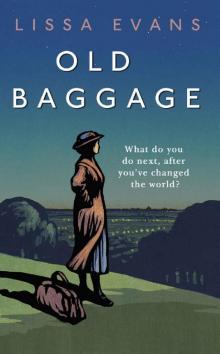 Old Baggage
Old Baggage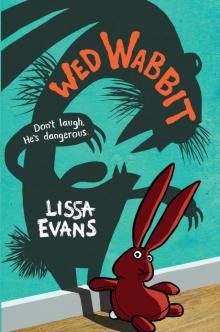 Wed Wabbit
Wed Wabbit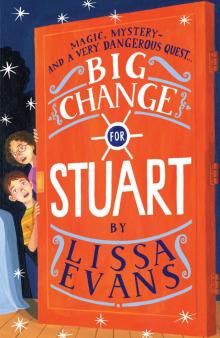 Big Change for Stuart
Big Change for Stuart Spencer's List
Spencer's List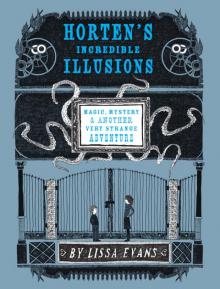 Horten's Incredible Illusions
Horten's Incredible Illusions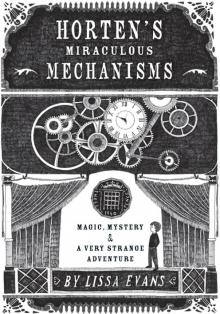 Horten's Miraculous Mechanisms
Horten's Miraculous Mechanisms Their Finest Hour and a Half
Their Finest Hour and a Half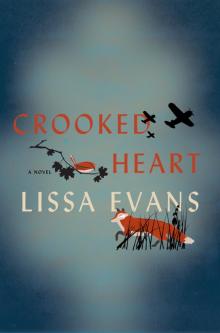 Crooked Heart
Crooked Heart